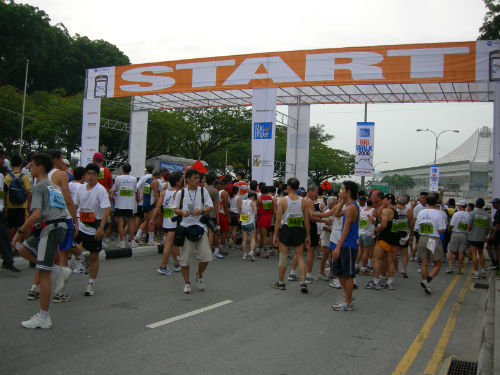You have been running several times a week and entering races on a regular basis, and now you want to set your sights higher by taking part in a half marathon (21.1km) race.
But do not think that you can just do a little bit of running and be able to complete the race. As a runner myself, I can tell you that training for a long-distance race such as this requires a lot of time commitment and dedication.
But once you have completed the race, the feeling of satisfaction simply cannot be described in words – it is something that you really have to experience.
Here are some tips on how you can get through your first half marathon safely.
Know what you can do
Look at your weekly running plan and calculate your weekly mileage. You need to be capable of running a minimum of 16 to 24 km per week before you should even consider signing up for a half marathon. If you have not got to this stage yet, make sure that you build up your distance base before you think of signing up for the event.
Train early
Do realise that 21.1km is a long run, so you should prepare yourself for the race by starting your training several months in advance. Do not simply start running about a couple of weeks before the race and think that you can get through it. You will end up struggling. A beginner runner should have about 20 weeks to train for the half marathon, while the more experienced runner must set aside a minimum of 12 weeks.
Vary your training pattern
When you are training, do not expect to be able to do a long run every time. You should vary your running distances. Preferably, you should run several times a week, and complete a long run every week.
Between your long runs, you could do shorter runs, often termed as “recovery runs” to give your muscles some time to heal after the long run. These runs should be an average of 4 to 8 km.
Also, you should not run every day. On the days you are not running, you should take part in other exercises, such as swimming or cycling. This is known as “cross training” and helps to prevent overuse of the muscles used for running.
Do not overexert yourself
Overexertion is one of the worst things that you can do as a runner, because it puts you at high risk of injury – as a result, you may not even be able to run the race that you have been training so hard for. So make sure that you just do what you are capable of, and do not run more than what your body can take.
On an average, you should increase the distance of your long runs by about 10 per cent every week, until the race day itself. Do not try to run any more than that; it would be pushing your body too hard.
Drink plenty of fluids
Fluids are very important especially if you are training for a half marathon, or any long distance race, for that matter. Not only would drinking liquids such as energy drinks hydrate you, but they also help to repair your muscles and prevent cramps. So if you are going for long runs, try to make sure you carry water or isotonic drinks with you, unless you know for sure that you will have easy access to water.
Try to refrain from alcohol or caffeine too, especially in the days leading up to the race, as these beverages increase your chances of muscle dehydration.
More Running Tips Here!
- Beginners Guide to Running
- Motivation for Running
- Running Routes in Singapore
- Running Clubs in Singapore
- Prevent Stitches in Running
- Recover from Running Injuries
- Pre-Race Tips for Running
See tips from top runners




I ?ay a quick visit daily some web sites and websites to ?ead
content, however this web site presents feature based posts.
Good and simple tips you have here and congrats to your completion for today’s army half marathon!
Thanks and congrats to you too, for your fast timing in the Army Half Marathon.
If you have any other tips, do share with us.
The tips you have here for half marathon are quite general.
So if it is towards a training program,there are quite a number of training resources to use.
Hal Higdon’s training program for half marathon is one: http://www.halhigdon.com/training/51130/Half-Marathon-Training-Guide and McMillan Running pace calculator to help you decide the training and race pace to aim for: https://www.mcmillanrunning.com/
Thanks for your run ideas.